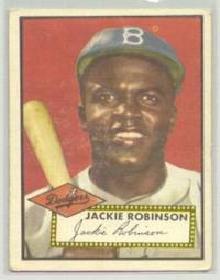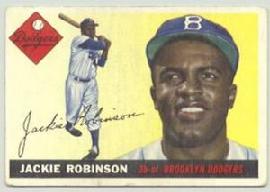






 |  |  |  |  |  |  |
 |
 |
Growing up in a large, single-parent family, Jackie excelled early at all sports and learned to make his own way in life. At UCLA, Jackie became the first athlete to win varsity letters in four sports: baseball, basketball, football and track. In 1941, he was named to the All-American football team. Due to financial difficulties, he was forced to leave college, and eventually decided to enlist in the U.S. Army. After two years in the army, he had progressed to second lieutenant. Jackie's army career was cut short when he was court-martialed in relation to his objections with incidents of racial discrimination. In the end, Jackie left the Army with an honorable discharge.
In 1945, Jackie played one season in the Negro Baseball League, traveling all over the Midwest with the Kansas City Monarchs. But greater challenges and achievements were in store for him. In 1947, Brooklyn Dodgers president Branch Rickey approached Jackie about joining the Brooklyn Dodgers. The Major Leagues had not had an African-American player since 1889, when baseball became segregated. When Jackie first donned a Brooklyn Dodger uniform, he pioneered the integration of professional athletics in America. By breaking the color barrier in baseball, the nation's preeminent sport, he courageously challenged the deeply rooted custom of racial segregation in both the North and the South. At the end of Robinson's rookie season with the Brooklyn Dodgers, he had become National League Rookie of the Year with 12 homers, a league-leading 29 steals, and a .297 average. In 1949, he was selected as the NL's Most Valuable player of the Year and also won the batting title with a .342 average that same year. As a result of his great success, Jackie was eventually inducted into the Baseball Hall of Fame in 1962.
Jackie married Rachel Isum, a nursing student he met at UCLA, in 1946. As an African-American baseball player, Jackie was on display for the whole country to judge. Rachel and their three children, Jackie Jr., Sharon and David, provided Jackie with the emotional support and sense of purpose essential for bearing the pressure during the early years of baseball.
Jackie Robinson's life and legacy will be remembered as one of the most important in American history. In 1997, the world celebrated the 50th Anniversary of Jackie's breaking Major League Baseball's color barrier. In doing so, we honored the man who stood defiantly against those who would work against racial equality and acknowledged the profound influence of one man's life on the American culture. On the date of Robinson's historic debut, all Major League teams across the nation celebrated this milestone. Also that year, on United States Post Office honored Robinson by making him the subject of a commemorative postage stamp. On Tuesday, April 15 President Bill Clinton paid tribute to Jackie at Shea Stadium in New York in a special ceremony.

 |  |  |  |  |  |  |